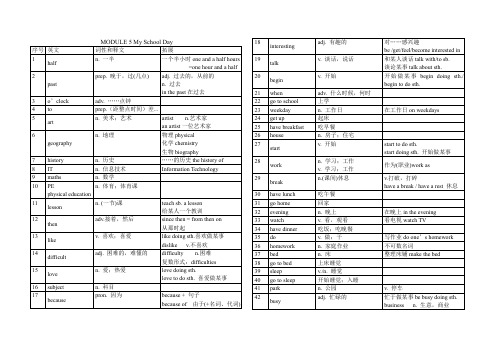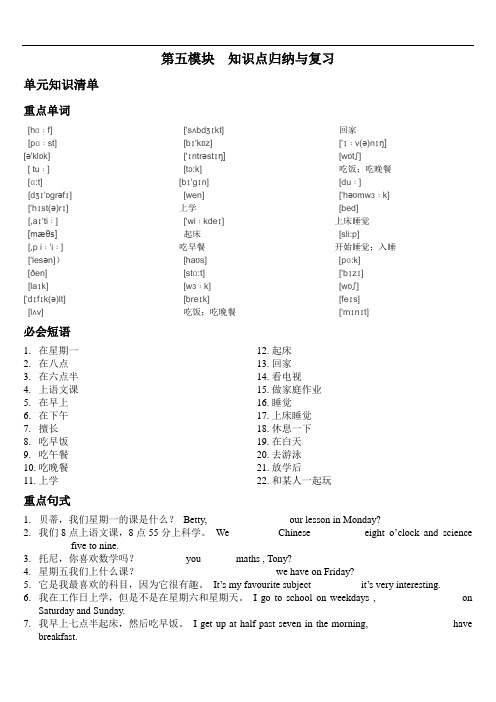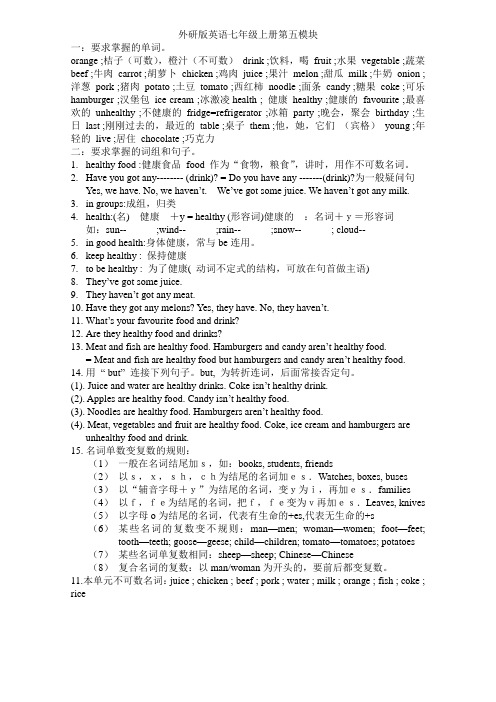七年级英语上册《module 5》知识点及练习(无答案) 外研版
_ Module5 My School Day知识点总结 外研版七年级英语上册

Key points1、①what 引导的特殊疑问句,what are our lessons 的同义表达what lessons do we have,这两句都可以用于询问“我们上什么课”。
②lesson 作名词,意为“(一节)课”,是可数名词。
Eg :We have an English lesson every day. 表示“第几课”要用“Lesson+基数词”,其中lesson 和基数词的首字母都要大写,基数词也可以用阿拉伯数字来表示。
Eg: Lesson Five.2、①上课 用短语“have+学科名称”或“have a/an+学科名称+ lesson/class ” Eg: have Chinese=have a Chinese lessonhave English=have an English lesson②be good at sth.(do well in ) 擅长某事 be good at doing sth.擅长做某事 Eg :She is good at playing football. =She does well in playing football.3、①because 连词,引导原因状语从句,常用来回答why 引导的特殊疑问句。
Eg: —Why do you like English? —Because it ’s interesting.5、go to school “去上学”,此时school 前不必加任何冠词。
【拓展】go to the school 意为“到那所学校去(不一定是去上学)”。
Eg :They go to the school to watch a football match.【固定搭配】go home 回家 go to college 去上大学 go to sleep 入睡;开始睡觉 注意go home 是动词短语,home 是地点副词。
外研版七年级上册Module 5基础知识与巩固练习(无答案)

外研版七年级上册Module 5 基础知识与巩固练习一、必背短语1.half past seven 七点半2.five to nine 八点五十五分3.in the afternoon/morning/evening 在下午/上午/晚上但当afternoon/morning/evening之前有具体日子修饰时,介词要用on. 如:on Monday afternoon 在星期一下午4.be good at doing = do well in doing 擅长做某事5.favorite subject 喜爱的科目6. talk with sb= talk to sb. (=speak to sb)与某人交谈7. on weekdays 在工作日8. get up 起床9. have breakfast / have lunch / have dinner 吃早餐/ 午餐/晚餐10. start to do = begin to do 开始做11. watch TV 看电视12. do one’s homework 做作业13. go to bed 去睡觉14. go to sleep 去睡觉15. have a break / have a rest 休息片刻16. have classes / lessons 上课17. have+具体科目名称eg: have geography上地理课18. like to do…/like doing…喜欢做某事19.in the day在白天at night在夜里20. play with sb21. make sth + 形容词(adj)eg: she makes maths interesting.22. finish school放学(动词短语)after school放学(介词短语)23. my school day 我的校园生活24. start work开始工作二、巩固练习:(一)单词拼写: 根据首字母提示或中文意思填入正确的单词。
Module5 外研社七年级英语 语法知识点

Module5语法知识点总结 Unit 11. What can I do for you?Can I help you?以上两句都是购物时候店主用语,可以翻译为‚我能为你做点什么?‛或‚你想买点什么?‛回答时,常用‚I’d like …/ I’d like to buy …/ I want to buy …‛等句子做答语。
-- What can I do for you?/Can I help you?-- I want to buy a present for my mum.2. May I try it on?try on 试穿如: try on the shoes before you buy them.【拓展】(1)try to do sth.‚努力去做,尽力做‛=try one’s best to do…如:He tried to climb the tree.他试着努力爬那棵树。
(2)try doing sth. 指‚尝试做……看看,有何结果‛,暗示在这之前已试过某种方法但不奏效,另试其他方法。
如:If no one answers the door, why not try knocking the back door?3. Look at the price. That’s too much.区分 too much 和 much too以上2个短语都强调的是后面的单词,much too是too的强势语,用法与too相同。
如:You are much too kind to me.你对我实在太好了。
This one is much too big.这个确实太大了。
too much是much的强势语,用法与much相似。
如:Don’t eat too much.别吃得太多。
There’s too much water.水太多了。
4. I’ll take it.take 拿、采取、穿…【拓展】take 短语take back 收回、接回、退回take down 写下、记下take in 收留、包括、理解、欺骗take off 脱下、起飞、打折扣take on 聘用、雇用、呈现、显现take up 从事、继续、占去(时间或空间)5. The strawberries look fresh.look在这里是感官系动词,表示‚看起来‛,其后加形容词,和be动词用法类似。
外研版七年级上册 Module 5 My school day知识点及练习

Module 5 My school day语法精选1. havehave是英语中常见的一个动词,它和不同的词搭配有不同的意思。
如:have lessons上课have breakfast/lunch/supper/dinner吃早饭/中饭/晚饭have a rest休息have a good time玩得愉快have a look看一看2. 表示时间的介词(at, on, in)的用法(1)at常用来表示时间点,即“在几点几分;在某一时刻”。
如:She usually gets up at 6:00 in the morning.她通常早上6点起床。
另外,at还可以用在at night(在晚上), at weekends(在周末), at noon(在中午)等固定短语中。
(2)on常用来表示“在某天或星期几”。
另外,表示“在具体某天的上午、下午或晚上”时,介词也用on。
如:on Sunday在星期天on February 8th在2月8日on Monday morning在星期一上午on the afternoon of November 21st在11月21日下午on a cold winter evening在一个寒冷冬天的夜晚(3)in表示“在某一段时间”,如某年、某月、某个季节。
如:in 1998 在1998年in March在三月in summer在夏天另外,在某一些固定短语中要用in。
如:in the morning在早上in the evening在晚上in the day在白天in the middle of the day在中午句法精析1. What’s the time? 几点了?在英语中,常用“What’s the time?”或“What time is it?”来询问时间,有时也可用“Do you know the time?”等句式来问时间。
回答均用“It’s...”。
第五模块专用 外研版七年级上基础知识点语法,词汇,行为动词的一般现在时

第五模块知识点归纳与复习单元知识清单重点单词[hɑːf][pɑːst] [ə'klɒk][tuː] [ɑ:t][dʒɪ'ɒgrəfɪ] ['hɪst(ə)rɪ] [,aɪ'tiː] [mæθs] [,p iː'iː] ['lesən])[ðen][laɪk]['dɪfɪk(ə)lt] [lʌv]['sʌbdʒɪkt][bɪ'kɒz]['ɪntrəstɪŋ][tɔ:k][bɪ'gɪn][wen]上学['wiːkdeɪ]起床吃早餐[haʊs][stɑ:t][wɜːk][breɪk]吃饭;吃晚餐回家['ɪːv(ə)nɪŋ][wɒtʃ]吃饭;吃晚餐[duː]['həʊmwɜːk][bed]上床睡觉[sli:p]开始睡觉;入睡[pɑ:k]['bɪzɪ][wɒʃ][feɪs]['mɪnɪt]必会短语1.在星期一_____________________________2.在八点_______________________________3.在六点半_____________________________4.上语文课_____________________________5.在早上_______________________________6.在下午_______________________________7.擅长_________________________________8.吃早饭_______________________________9.吃午餐_______________________________10.吃晚餐_______________________________11.上学_________________________________ 12.起床_________________________________13.回家_________________________________14.看电视_______________________________15.做家庭作业___________________________16.睡觉_________________________________17.上床睡觉_____________________________18.休息一下_____________________________19.在白天_______________________________20.去游泳_______________________________21.放学后_______________________________22.和某人一起玩_________________________重点句式1.贝蒂,我们星期一的课是什么?Betty, _______ ________ our lesson in Monday?2.我们8点上语文课,8点55分上科学。
外研版七年级英语上册Module 5 知识汇总

Module5知识梳理【重点短语】1.my school day 我的学校生活2.on Tuesday 在星期二3.have Chinese=have a Chinese lesson 上语文课4.at five to nine =at eight fifty-five 在八点五十五5.at half past seven =at seven thirty 在七点半6.on Wednesday afternoon 在星期三下午7.be good at...=do well in... 擅长于......, 在......做得好8.talk with/to sb 和......谈话9.on weekdays=on the weekday 在工作日10.go to school 上学11.go home 回家12.have a healthy breakfast 吃健康早餐13.go swimming 去游泳14.play football 踢足球15.play with sb 和......玩耍16.make apple juice 制作苹果汁17.in the kitchen . 在厨房里18.do sports 进行体育锻炼19.want to do sth 想做......20.on weekends=on the weekend 在周末21.get up 起床22.have breakfast 吃早饭23.be next to.... 紧挨着..24.start work=start lessons 开始工作/学习25.have a break (for twenty minutes) 休息(20分钟)26.go to the playground 到操场27.watch TV 看电视28.have dinner with sb 和...... 吃晚饭29.do one’s homework 做某人的家庭作业30.do one’s maths homework 做某人的数学家庭作业31.go to bed 上床睡觉32.go to sleep 入睡33.wash one’s face 洗脸34.make sb/sth +形容词使某人/物怎么样make him happy 使他开心make the room clean 使房间干净35.have a busy day 度过繁忙的一天36.after school 放学后(表时间的短语)37.finish school 放学(实义动词短语)【重点句子】1. What’s the time?=What time is it? 几点了?It’stwenty past one.=It’s one twenty. 一点二十。
外研版英语七年级上册Module 5知识点归纳

外研版英语七年级上册第五模块一:要求掌握的单词。
orange ;桔子(可数),橙汁(不可数)drink ;饮料,喝fruit ;水果vegetable ;蔬菜beef ;牛肉carrot ;胡萝卜chicken ;鸡肉juice ;果汁melon ;甜瓜milk ;牛奶onion ;洋葱pork ;猪肉potato ;土豆tomato ;西红柿noodle ;面条candy ;糖果coke ;可乐hamburger ;汉堡包ice cream ;冰激凌health ; 健康healthy ;健康的favourite ;最喜欢的unhealthy ;不健康的fridge=refrigerator ;冰箱party ;晚会,聚会birthday ;生日last ;刚刚过去的,最近的table ;桌子them ;他,她,它们(宾格)young ;年轻的live ;居住chocolate ;巧克力二:要求掌握的词组和句子。
1.healthy food :健康食品food 作为“食物,粮食”,讲时,用作不可数名词。
2.Have you got any-------- (drink)? = Do you have any -------(drink)?为一般疑问句Yes, we have. No, we haven’t. We’ve got some juice. We haven’t got any milk.3.in groups:成组,归类4.health:(名)健康+y = healthy (形容词)健康的:名词+y=形容词如:sun--______;wind--______;rain--______;snow--______; cloud--______5.in good health:身体健康,常与be连用。
6.keep healthy : 保持健康7.to be healthy : 为了健康( 动词不定式的结构,可放在句首做主语)8.They’ve got some juice.9.They haven’t got any meat.10.Have they got any melons? Yes, they have. No, they haven’t.11.What’s your favourite food and drink?12.Are they healthy food and drinks?13.Meat and fish are healthy food. Hamburgers and candy aren’t healthy food.= Meat and fish are healthy food but hamburgers and candy aren’t healthy food. 14.用“ but”连接下列句子。
外研版七年级上册英语Module 5 My school day知识总结

Module 5 My school day 知识总结24.一堂有关健康的课 a lesson in good health26.橙汁orange juice27.保持健康keep healthy28.垃圾食品unhealthy foodin good health29 .健康30.为了健康to be healthyHe does well in music.他音乐方面山色。
2.in bed意为“卧床”,指人因病卧床或卧床休息。
on the / one\ bed表示“在某张/某人的床上”,指某人或某物在床上。
go to bed上床睡觉make the/one^s bed整理床铺eg. He is in bed.他卧病在床。
Your book is on the bed.你的书在床上。
三、基本句型1 .对时间提问:What time is it? What5s the time? 回答:It,s + 时间点。
eg. --- What time is it?几点了?--- It's half past eight.八点半了。
2.对星期几提问:What day is it today? 回答:It,s+星期几。
eg. --- What day is it today?今天星期几?--- It's Saturday.星期六。
3.对日期提问:Whafs the date today?今天几号?回答:It,s+日期。
eg. --- Whafs the date today?今天几号?--- Ifs October 27 th.今天是10 月27日。
四、语法1. 一般现在时(1)概念:表示谓语是经常性和习惯性发生的动作或存在的状态。
谓语动词往往是具有一般性,经常性,习惯性和规律性的动作或状态特征。
(2)常见的标志有:always, usually, often, sometimes, seldom, never, every day, every week,every month, every year, once a week, twice a month.(3)谓语动词形式:谓语动词使用原形或第三人称单数形式。
- 1、下载文档前请自行甄别文档内容的完整性,平台不提供额外的编辑、内容补充、找答案等附加服务。
- 2、"仅部分预览"的文档,不可在线预览部分如存在完整性等问题,可反馈申请退款(可完整预览的文档不适用该条件!)。
- 3、如文档侵犯您的权益,请联系客服反馈,我们会尽快为您处理(人工客服工作时间:9:00-18:30)。
Module 5语法介词at、in、on 表时间at表示时间时,用于钟点前或具体的时刻前。
如:at three/three o'clock 在三点,at noon 在中午,at night 在夜晚in表示时间时,用于泛指一天的上午、下午、晚上等;用于某个较长的时间,如年、月、季节等。
如:in the morning/afternoon/evening在上午/ 下午 / 晚上,in 2003在2003年on表示时间时,用于具体某一天或某一天的上午、下午、晚上。
如:on Sunday 在周日,on Monday morning/afternoon/evening 在星期一上午 / 下午 / 晚上on也常用于某一公共节假日的名词前。
如:on New Year's Day 在元旦,on Children's Day 在儿童节行为动词的一般现在时1. 要表达经常性或习惯性的动作,要用一般现在时。
如:I do my homework and go to bed at ten o’clock. 我做完作业,然后在10点上床睡觉。
I get up at half past seven in the morning and have breakfast. 我早上7点半起床,然后吃早餐。
2. 表示现在的状态,也可用一般现在时。
如:I know him very well. 我和他很熟。
I like English very much. 我非常喜欢英语。
3. 与一般现在时连用的时间状语:always, usually, often, sometimes, every day, once a day等等。
这些时间状语可看作一般现在时的标志词。
如:Lucy sometimes has lunch at school. 露西有时在学校吃午饭。
课本要点1. What’s the time? 几点了?此句型用来提问具体的时间点,相当于What time is it?,回答时要用It’s + 具体的时间.。
如:—What’s the time? 几点了?—It’s one twenty-five. 一点二十五。
注意:时间的表达方式有以下几种:(1)整点:当我们说到“几点整”时,就用那个数字加上“o’clock”。
如:8:00 8 o’clock,9:00 9 o’clock时间也可以用数词来表示:eight o’clock,nine o’clock(2)不是整点的时间有两种表达方式:一种是数词表达法,也就是直接读出时间的数字。
如:6:30 six thirty,8:15 eight fifteen另一种是文字表达法。
当分钟不超过半个小时时,可以用“分钟数 + past + 钟点数”,意为“……点过……分”。
如:6:30 half past six,8:15 fifteen past eight或a quarter past eight当分钟超过半个小时时,除了可以使用数字表达法以外,我们还可以用另一种方式:“60 - 分钟数 + 介词to + 下一个钟点数”意为“……点差……分”。
如:8:45 a quarter to nine,9:50 ten to ten注意:这时就不能说forty five past eight或fifty past nine。
2. When is your English lesson? 你们什么时候上英语课?(1)when提问时间,意为“什么时候”,可以是较长的时间段,也可以是较短的时间点。
如:—When is your birthday? 你的生日是什么时候?—My birthday is Dec 29th. 我的生日是12月29日。
这里when就是指一天的时间段。
—When do you go home? 你几点回家?—I go home at 4:30 p.m. 我下午4:30回家。
这里when提问的是具体的时间点。
(2)提问具体几点我们通常用what time。
如:—What time do you get up? 你几点起床?—At seven. 七点。
词汇◆ likelike用作行为动词,表示“喜欢”,放在主语后面,用作谓语,其后可接名词、代词、动名词和动词不定式。
如:We like English. 我们喜欢英语。
They like swimming. 他们喜欢游泳。
其否定结构是在like前面加上助动词do和表示否定意义的副词not,缩写成don’t。
如:I don’t like maths. 我不喜欢数学。
◆ havehave 在本模块中有很多用法:have dinner 吃晚餐,have a break 休息一下= take a break,have lessons 上课。
注意: have意为“吃”,后接三餐名词时,三餐前不需要加任何的冠词,可用eat替换。
如:eat breakfast 吃早饭◆ talktalk作动词,意为“交谈;谈论”,为不及物动词,常与介词搭配构成短语。
常用的短语有:talk about sth. / sb. 谈论某事或某人,talk to sb. 对……说话, 强调一方对另一方,talk with sb. 和……交谈,强调双方谈话。
◆ andand是并列连词,用来连接两个并列的成分。
如:He loves English and Chinese. (and连接两个并列的宾语)He and I are good friends.(and连接两个并列的主语)She can sing and dance.(and连接两个并列的谓语)◆ finishfinish是动词,与start 或begin意义相反,作不及物动词,意为“结束,停止”,常与表示时间的词语连用。
finish作及物动词时后接动词的-ing形式,即finish doing sth. 表示“完成……”。
Ⅱ. 单项选择(10分)1. We have __________ English class __________ Monday morning.A. an; inB. a; onC. a; inD. an; on2. We have geography __________ two o’clock in the afternoon.A. atB. inC. onD. from3. I like art, __________ I don’t like maths.A. andB. butC. orD. because4. What __________ you __________ for lunch?A. have; haveB. do; hasC. do; haveD. does; have5. —__________ eating some fish for supper?—Sorry, I don’t like it.A. Let’sB. Would you likeC. What aboutD. Shall we6. I like coffee __________ milk in it.A. withB. inC. haveD. of7. My teacher often __________.A. talk to IB. talk to meC. talks to myD. talks to me8. My brother does __________ homework every day.A. manyB. anyC. muchD. a lots of9. I often have a __________ day at school, but I am very happy.A. freeB. busyC. goodD. bad10. —Does Potter like playing computer games?—No, he __________. He only likes reading books.A. isn’tB. don’tC. doesn’tD. didn’tⅣ. 阅读理解(10分)Tom comes from Australia. He is now staying in Beijing with his family. Every day he gets up at about six thirty and has breakfast at seven o’clock. Then he leaves home at seven fifteen. He gets to school at seven forty- five. His first class begins at eight. There are four lessons in the morning. Morning classes are over at eleven fifty, and he has lunch ten minutes later.Afternoon classes begin at one thirty. There are two lessons in the afternoon. They are over at three ten. Tom stays at school for another hour to play games, and he gets home at about four thirty.Tom usually has supper at six. In the evening he does his homework. Sometimes he watches TV. He goes to bed at about ten.1. Tom comes from _________.A. EnglandB. CanadaC. AmericaD. Australia2. It takes Tom __________ to get to school every day.A. two hoursB. half an hourC. fifteen minutesD. an hour3. Tom usually has lunch at __________.A. 11: 50B. 12: 00C. 12: 10D. 12: 204. Tom does his homework __________.A. in classB. at schoolC. in a parkD. at home5. Tom has __________ lessons every day.A. sixB. fourC. eightD. two第Ⅱ卷(共60分)Ⅴ. 词汇运用(10分)(Ⅰ) 根据句意及首字母提示完成单词(5分)1. I usually go to school at h__________ past seven.2. How many l__________ do you have on Monday?3. Class is over. Let’s have a b__________.4. Her sister’s favourite s__________ is art.5. I like listening to music. What a__________ you?(Ⅱ)用所给词的适当形式填空(5分)6. We don’t have any __________ (lesson) on Sundays.7. The teacher is very busy. He often _________ (sleep) at half past eleven.8. I can __________ (play) football, but Burt can’t.9. What__________ he usually __________ (do) after school?10. You can’t go to bed until (直到) you finish __________ (do) your homework.Ⅵ. 完成句子(10分)1. ——现在几点钟了?— __________ __________ __________ __________ now?——九点钟了。
